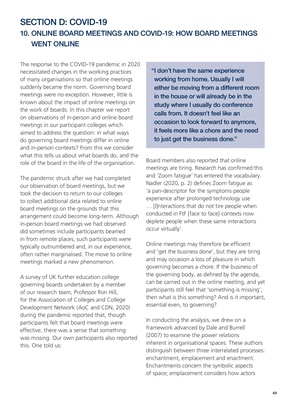
49
The response to the COVID-19 pandemic in 2020
necessitated changes in the working practices
of many organisations so that online meetings
suddenly became the norm. Governing board
meetings were no exception. However, little is
known about the impact of online meetings on
the work of boards. In this chapter we report
on observations of in-person and online board
meetings in our participant colleges which
aimed to address the question: in what ways
do governing board meetings differ in online
and in-person contexts? From this we consider
what this tells us about what boards do, and the
role of the board in the life of the organisation.
The pandemic struck after we had completed
our observation of board meetings, but we
took the decision to return to our colleges
to collect additional data related to online
board meetings on the grounds that this
arrangement could become long-term. Although
in-person board meetings we had observed
did sometimes include participants beamed
in from remote places, such participants were
typically outnumbered and, in our experience,
often rather marginalised. The move to online
meetings marked a new phenomenon.
A survey of UK further education college
governing boards undertaken by a member
of our research team, Professor Ron Hill,
for the Association of Colleges and College
Development Network (AoC and CDN, 2020)
during the pandemic reported that, though
participants felt that board meetings were
effective, there was a sense that something
was missing. Our own participants also reported
this. One told us:
Board members also reported that online
meetings are tiring. Research has confirmed this
and 'Zoom fatigue' has entered the vocabulary.
Nadler (2020, p. 2) defines Zoom fatigue as
'a pan-descriptor for the symptoms people
experience after prolonged technology use
… [I]nteractions that do not tire people when
conducted in FtF [face to face] contexts now
deplete people when these same interactions
occur virtually'.
Online meetings may therefore be efficient
and 'get the business done', but they are tiring
and may occasion a loss of pleasure in which
governing becomes a chore. If the business of
the governing body, as defined by the agenda,
can be carried out in the online meeting, and yet
participants still feel that 'something is missing',
then what is this something? And is it important,
essential even, to governing?
In conducting the analysis, we drew on a
framework advanced by Dale and Burrell
(2007) to examine the power relations
inherent in organisational spaces. These authors
distinguish between three interrelated processes:
enchantment, emplacement and enactment.
Enchantments concern the symbolic aspects
of space; emplacement considers how actors
SECTION�D:�COVID-19
10.��ONLINE�BOARD�MEETINGS�AND�COVID-19:�HOW�BOARD�MEETINGS�
WENT ONLINE
"�I�don't�have�the�same�experience�
working�from�home.�Usually�I�will�
either�be�moving�from�a�different�room�
in�the�house�or�will�already�be�in�the�
study�where�I�usually�do�conference�
calls�from.�It�doesn't�feel�like�an�
occasion�to�look�forward�to�anymore,�
it feels more like a chore and the need
to�just�get�the�business�done."